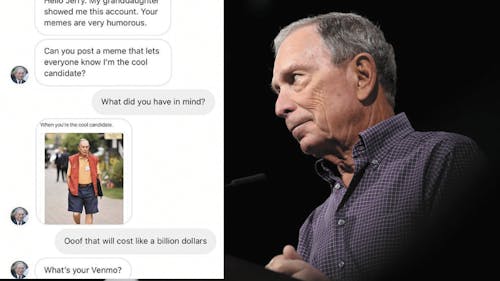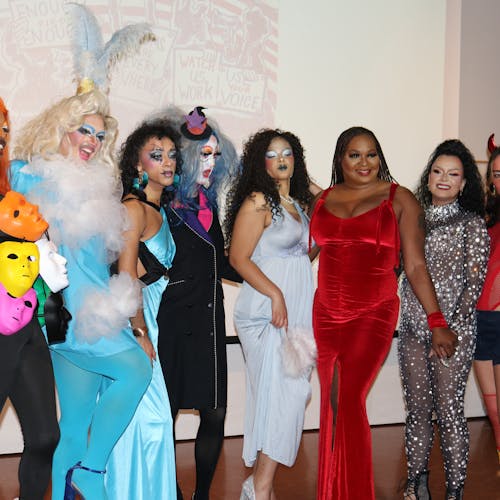Bloomberg uses memes, millions in presidential ad campaign

Former Mayor Michael Bloomberg announced on Nov. 7, 2019, that he was taking steps to enter the Democratic nominee race. For the majority of America, especially those living on Twitter and the meme-o-sphere, this news did not matter.
There was still so much content of President Donald J. Trump and the already-known Democratic nominees to entertain oneself with that Bloomberg remained largely irrelevant. That is, until he decided to invade the meme-o-sphere artificially and with force.
The first indications that Bloomberg was entering the race started with his huge $30 million investment into advertisement campaigns across America, according to The New York Times.
This elicited Fred Armisen’s impersonation of Bloomberg in the "Saturday Night Live" sketch, “2020 Democratic Debate.” During the debate, Rachel Maddow is shown wondering how Bloomberg has entered the stage. Armisen responded, “I tipped the doorman $30 million dollars.”
Although the sketch was meant to be facetious, Sen. Bernie Sanders (D-Vt.) was less than amused when he said, “I’m disgusted by the idea that Bloomberg or any other billionaire thinks they can circumvent the political process and spend tens of millions of dollars to buy our election.” After infiltrating the latest Democratic debate, it seems Bloomberg thinks he can do just that.
Bloomberg doesn't plan to achieve his goal through TV ad campaigns, but rather through similar tactics to that of Trump: infiltrating social media. In these past few weeks and in anticipation of the Feb. 19 Las Vegas Democratic debate, Bloomberg went on the offensive. He asked various Instagram channels to post memes of himself in an attempt to “make him seem like the cooler candidate.”
Examples of these Instagram accounts include kalesalad, f***jerry, tank.sinatra, and more. Buzzfeed News describes them as being in the form of a private direct message between Bloomberg and the channel creators, with Bloomberg asking them for help on creating a meme. Many of these are satirical, pointing out that Bloomberg can be cool simply because he’ll pay the channels to make him cool.
Memes are inherently funny because they're made naturally. Having them be inorganic and paid for seems inauthentic.
With the inpouring of Bloomberg memes, Instagram even had to redefine its rules on sponsored content to make sure that users understood where the content was coming from. It even banned the branded content of political operations, according to TechCrunch.
In response to Bloomberg’s memes, Instagram now requires the use of the Branded Content Ads tool for any deals between the sponsor and influencer.
Could this attempt at trying to be more relatable actually end up backfiring on him? As Trump went on the campaign in Las Vegas, Bloomberg bought a series of billboards to troll Trump’s campaign. “Donald Trump eats burnt steak. Mike Bloomberg eats his medium rare,” according to one advertisement. This quickly turned into a Twitter sensation where people replaced the anti-Trump advertisements with sarcastic commentary of Bloomberg.
This also remains a common theme in Bloomberg’s campaign. He can’t seem to shake off the image he acquired as mayor of New York City. Videos have been resurfacing of Bloomberg attending a hot dog eating contest with Trump back when he was mayor.
As mayor of New York City, Bloomberg had been a major proponent of the stop-and-frisk policy that adversely affected minorities. This policy led to the stopping and targeting of young adult minorities and yet still ultimately failed to reduce gun crimes.
These failures contribute to the uneasiness many voters feel in supporting Bloomberg.
In another attempt at portraying himself in a flattering way, Bloomberg posted a heavily edited video of himself asking the other candidates, “Am I the only one who has successfully started a business”? To which the fabricated reply was silence, making it seem as if Bloomberg did well in the debate. Despite the misrepresentation of the debate, Facebook has declined to take down the video.
What constitutes misinformation and who gets to decide? These are still questions that need to be answered. In the meantime, Bloomberg will continue to employ every strategy possible to promote his image, while media consumers remain none the wiser.



